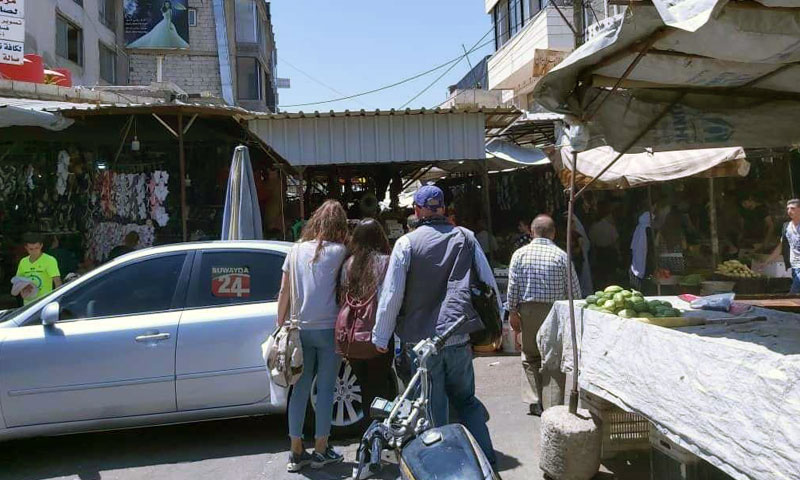Along the sidewalks and on the squares of the city of Suwayda, southern Syria, street merchants set up stalls and kiosks, which make for their only source of living that the Suwayda City Provincial Directorate attempts to rid of, without trying to regulate or transport them to different places. In retaliation, and to protect their stalls, merchants are resorting to weapons.
On September 8, the Suwayda City Council’s Violation Control Committee was shot at while attempting to remove dozens of fuel and gas stalls in the area, but no injuries were recorded.
The President of the Suwayda City Council, Bashar al Ashqar, told the local newspaper Al-Watan on September 19, that the Suwayda Provincial Directorate was working on removing the non-compliant stalls from the city’s squares when the committee was fired on, due to which the whole operation was aborted.
The incident, as monitored by Enab Baladi, triggered a mix of reactions, expressed by the interviewed citizens; some of whom considered the incident a violation of the law while others viewed it as restrictions imposed on the citizens.
Display of power
One of the affected merchants, interviewed by Enab Baladi, believes that the operation held by the Suwayda Provincial Directorate is “a display of power through which the government tries to demonstrate that everything is under its control.”
The merchant, wishing not to be named for security reasons, added that many ‘stalls’ work for the interests of officials in the governorate, obtaining facilities and licenses through the connection between the merchants owning the stalls and officials, stressing that these stalls were not approached nor there owners were prosecuted for violating the law, and the only explanation is that they are ‘immune.’
Al-Watan, known for being close to the Syrian regime, affirmed in a report published on September 19, that “there are stalls belonging to influential figures in the governorate, which once interrogated about the way they work and the nature of their work, the answer would be made through threats and guns.”
A member of a civil organization in Suwayda, who asked not to be named for security reasons, blamed the proliferation of the stalls in the city on the government of the Syrian regime.
“It is not the stall owners’ fault, but rather the government’s that considers itself still capable of leading the people,” he told Enab Baladi.
Regulation needed
Abu Ismail, fifty five years old, old told Enab Baladi that he is not against using stalls for trade, but he is against the armament of the merchants and using arms in civilian areas, which put the people at the risk of getting wounded.
Abu Ismail, who requested that his real name be disclosed for security concerns, blamed the Syrian regime’s government for trying to eliminate “the livelihoods of low-income citizens,” as he put it, without acting towards organizing or moving the “stalls” to one place, where they can continue their work without being deprived of their source of living.
On the other hand, Huda, a university student at the Faculty of Agricultural Engineering, who asked not to be named for security reasons, thinks that the spread of ‘stalls’ and sidewalk vending, offering clothes, shoes and food, as well as smoke and fuel kiosks, impede the orderly movement of pedestrians on sidewalks and public squares.
Additionally, Huda pointed out that a sidewalk which does not exceed 300 meters takes her several minutes to pass on the way to university, due to a magnificent number of citizens who stop to observe the laid-out goods.
Huda is calling for a solution to these ‘stalls,’ requesting that they not be left to this random state.

